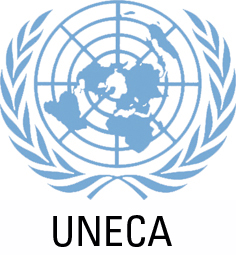Focal point
Location
P.O. Box 3001
Addis Ababa, Ethiopia
Established by the Economic and Social Council (ECOSOC) of the United Nations (UN) in 1958 as one of the UN's five regional commissions, ECA's mandate is to promote the economic and social development of its member States, foster intra-regional integration, and promote international cooperation for Africa's development.
Made up of 54 member States, and playing a dual role as a regional arm of the UN and as a key component of the African institutional landscape, ECA is well positioned to make unique contributions to address the Continent’s development challenges.
ECA’s thematic areas of focus are as follows:
- Macroeconomic Policy
- Regional Integration and Trade
- Social Development
- Natural Resources
- Innovation and Technology
- Gender
- Governance
Members:
Resources
Displaying 461 - 465 of 872The role of women in agro-industries in four eastern and southern Africa countries : Botswana, Lesotho,Tanzania and Zimbabwe
This paper focuses on the role of women in agro-industries in eastern and southern Africa. The women of Africa have' historically played key roles in the African economy as contributors to their society and as caretakers of the family while their, husbands are away working in mines, plantations or cities. African women are starting to get acknowledged as the ones who predominantly produce food crops.
Subregional co-operation on the production of tubers and cerals in east and southern Africa, with particular emphasis on the role of women
The scale and persistence of the food crisis in Africa during the last
20 years is of the gravest concern to African governments as well as to the international community. Food production is not able to keep pace with population growth and many countries in the continent have become increasingly dependent on imports of food stuffs originating from international aid.
Subregional co-operation on the production of tubers and cerals in east and southern Africa, with particular emphasis on the role of women
The scale and persistence of the food crisis in Africa during the last
20 years is of the gravest concern to African governments as well as to the international community. Food production is not able to keep pace with population growth and many countries in the continent have become increasingly dependent on imports of food stuffs originating from international aid.
Rural progress : the role of production cooperatives in africa
Many countries are today confronted with the challenging tasks of improving the level of living and the productive capacities of their people especially in the spheres of agriculture and food production. While governments are mainly concerned with providing structural support the actual implementation lies with the individuals, who in the final analysis are the farmers and the rural population.
Reduction of food losses through insect pest management and use of small scale and low cost farm equipment : progress report for the period from 1st January to 30th june 1987
The document focuses on the growing demand for regional facilities for demographic research and training in Africa, the United Nations Economic commission for Africa approved, at its Ninth Session in 1968, the establishment of two new institutes, which would provide training and conduct research in the region. One of these was to serve the English-speaking Countries of Africa, taking into consideration the coverage of the Cairo Demographic Centre, and the need to avoid the duplication or facilities, while the other was to serve the French-speaking countries or Africa, south of Sahara.


